Lucas Lara Conferences
The Lucas Lara conferences is a cycle of public outreach conferences that is being held at the Instituto de Astrofísica de Andalucía (IAA-CSIC) since a long time. The last Thursday of every month (except summer months) the IAA-CSIC opens its doors at 19pm for anyone who wants to approach the world of science.
Displaying 1 - 23 of 23
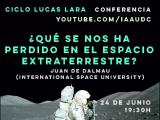
|
24/06/2021 - 19:30
What have we missed in extraterrestrial space? Juan de Dalmau, president of the International Space University and former director of Ariane rocket launch operations in French Guiana, will answer frequently asked questions about space exploration. Juan de Dalmau |
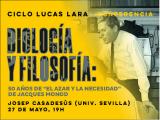
|
27/05/2021 - 19:00
Biology and philosophy. 50 years of Jacques Monod's "Chance and Necessity". In the book "Chance and Necessity", published in 1970, Monod examines the philosophical implications of modern biology. Josep Casadesús |
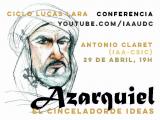
|
29/04/2021 - 19:00
Azarquiel, the chiseler of ideas The history of science in Spain has never been a subject that has been valued in its fair measure, even by Spanish scientists themselves today. In this talk we will focus on the figure of Azarquiel, representative of medieval science. Antonio Claret |
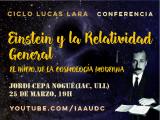
|
25/03/2021 - 19:00
Einstein and General Relativity. The beginning of modern cosmology The General Theory of Relativity has represented, together with quantum physics, the beginning of the so-called modern physics. Jordi Cepa Nogué |
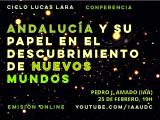
|
25/02/2021 - 19:00
Andalusia and its role in the discovery of new worlds In twenty-five years we have gone from thinking that our Solar System was the only one in the Galaxy to knowing that there are thousands of planets already detected and that there could be billions out there. Pedro J. Amado |
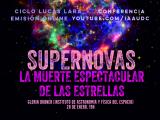
|
28/01/2021 - 19:00
Supernovae: the spectacular death of stars A star that goes out in the universe ending its life as a supernova is a source of everything but darkness. Gloria Dubner |
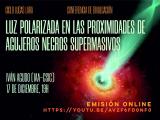
|
17/12/2020 - 19:00
Polarized light in the vicinity of supermassive black holes Relativistic jets produced by supermassive black holes are the most energetic astrophysical objects known and can be observed up to enormous distances and very early ages in the universe. This lecture will focus on these objects, and more specifically on their main characteristics and the extra information provided by studying the polarized light they emit, as well as the main questions that remain to be answered to fully understand them. Iván Agudo |

|
26/11/2020 - 19:00
The Symbolic Primate. How language and culture made us human Humans diverged from our closest relative, the chimpanzee, about seven million years ago, a relatively short time from an evolutionary point of view. Biological continuity with the chimpanzee is evident in many physiological and behavioral aspects; equally evident is the cognitive gap between the two species. In this talk I will attempt to outline the process of hominization based on data from paleontology, genetics, bioinformatics,... Pablo Rodríguez Palenzuela |
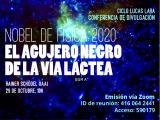
|
29/10/2020 - 19:00
Nobel Prize in Physics 2020: the black hole in the Milky Way galaxy Andrea Ghez and Reinhard Genzel were awarded the Nobel Prize in Physics 2020 for their discovery of the massive black hole at the center of the Milky Way. In my talk I will review the history of their research work from a front-line point of view (having worked closely with the two researchers on this topic). I will explain the methods and measurements they used and the strength of their results. Rainer Schödel |
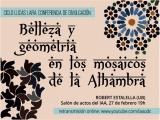
|
27/02/2020 - 19:00
Beauty and geometry in Alhambra mosaics Dissemination conference, Lucas Lara cycle. Robert Estalella |
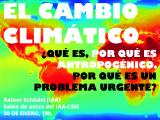
|
30/01/2020 - 19:00
What is climate change, why is it anthropogenic and why is it an urgent problem? What is climate change, why is it anthropogenic and why is it an urgent problem? Rainer Schödel |
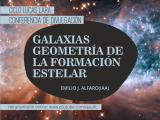
|
19/12/2019 - 19:00
Galaxies. Geometry of star formation Outreach conference Emilio J. Alfaro |

|
28/11/2019 - 19:00
If we cannot save Galapagos, what can we save? Outreach conference Silbia López de Lacalle |

|
31/10/2019 - 00:15
Seriously: Is anyone out there? Juan Carlos Suárez |
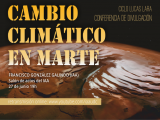
|
27/06/2019 - 19:00
Climate change in Mars Outreach conference about the atmosphere and climate variability of the red planet Francisco González Galindo |
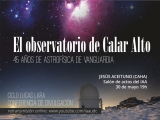
|
30/05/2019 - 19:00
The Calar Alto Astronomical Observatory: 45 years of cutting-edge astronomy It has been 45 years since Calar Alto Observatory was founded. An observatory that, among its merits, has been one of the main engines of the development of astronomy in Spain and, of course, one of the foundations of the creation of the Instituto de Astrofísica de Andalucía (Andalusian Astrophysics Institute). This year the observatory goes from being Hispano-German to being totally Hispanic, with the incorporation of the Junta de Andalucía... Jesús Aceituno |

|
25/04/2019 - 19:00
The first image of a black hole The Horizon Event Telescope (EHT), a planetary-scale telescope made up of eight radio telescopes and forged through international collaboration, was designed to capture the first image of a black hole. In a series of simultaneous international press conferences on April 10, EHT researchers revealed that they had succeeded and showed the first direct visual evidence of a super-massive black hole and its shadow. José Luis Gómez |
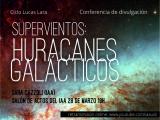
|
28/03/2019 - 19:00
Superwinds: galactic hurricanes Galactic superwinds, common phenomena in galaxies, are capable of releasing an extraordinary amount of energy and transporting material over long distances. Their influence on the host galaxy can be of great importance, to the extent that the formation of these "galactic hurricanes" can even determine the life of galaxies. The study of these phenomena provides us with some keys to solving the enigmas of modern astronomy about the evolution of... Sara Cazzoli |
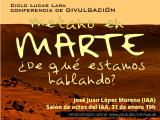
|
31/01/2019 - 19:00
Methane in Mars: what are we talking about? We review the evidence of the existence of methane on Mars and its possible implications. José Juan López Moreno |
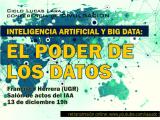
|
13/12/2018 - 19:00
Artificial Intelligence and big data: the power of data Artificial Intelligence and big data: the power of data. Outreach conference Francisco Herrera |
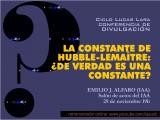
|
29/11/2018 - 19:00
The Hubble-Lemaître constant: is it really a constant? Following an open debate, the International Astronomical Union recently recommended that the rate of expansion of the universe, traditionally referred to as the "Hubble Constant", should henceforth be referred to as the "Hubble-Lemaître Constant". Emilio J. Alfaro |
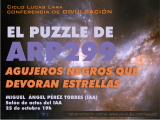
|
25/10/2018 - 19:00
The Arp299 puzzle. Black holes that devour stars In January 2005, a bright flash was detected in the nucleus of the galaxy in the process of fusion Arp 299-B, which was considered a supernova explosion. However, ten years of observations at different wavelengths have allowed us to witness how the luminous region was lengthening and expanding, and to conclude that it is a jet of material expelled by the galaxy's central super-massive black hole after tearing a star. Miguel Ángel Pérez-Torres |
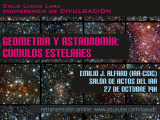
|
27/10/2016 - 19:00
Geometry and astronomy: stellar clusters Geometry and astronomy: stellar clusters Emilio J. Alfaro |